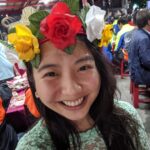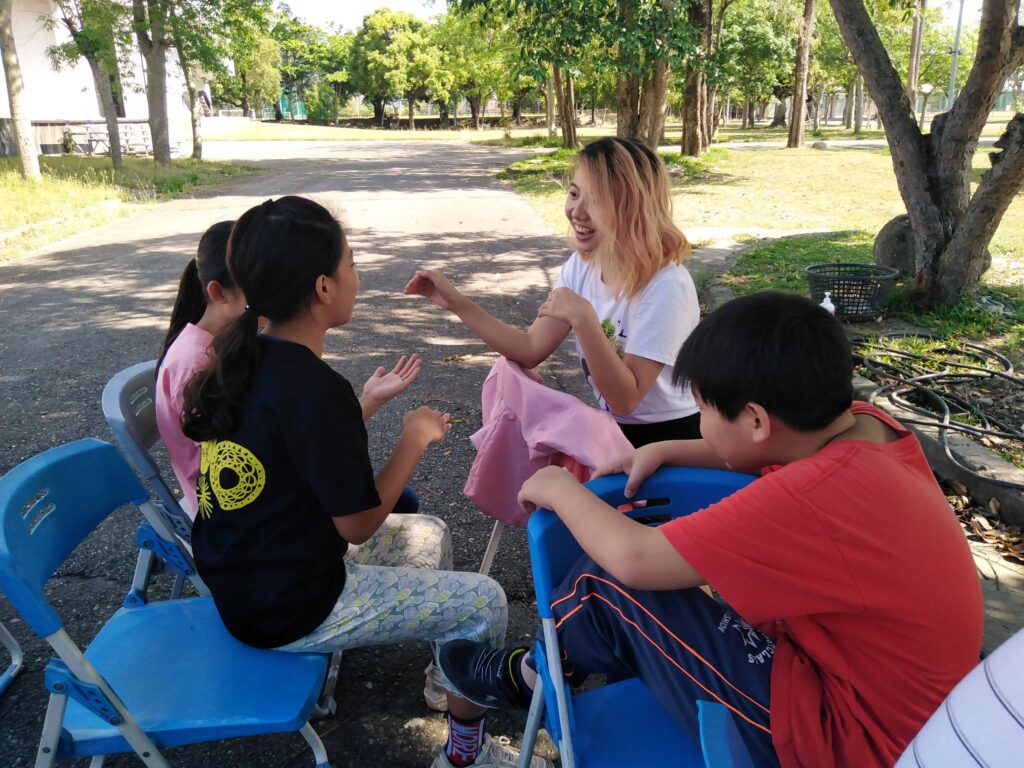
The Fulbright U.S. Student Program annually grants over a thousand Fulbright English Teaching Assistant Awards (Fulbright ETA) in nearly 100 countries worldwide. Fulbright ETAs teach English full-time and serve as U.S. cultural ambassadors in their respective international communities for approximately one year.
Sunny Huang, who was a Fulbright ETA grantee in Taiwan, taught English in two elementary schools in remote Indigenous communities. In this article, Sunny shares how her transformative years as a Fulbright grantee led to pivoting careers into business, developing transferrable professional and personal skills, and, most importantly, re-envisioning what living and community look like. She gives honest insights into the difficulties of managing expectations and work-life balance during her Fulbright and candid advice for Fulbright applicants and current Fulbright grantees.
Tell us about your background and professional journey. What led you to the Fulbright English Teaching Assistant Award and teaching English in Taiwan?
I grew up as the proud 姊姊 jiě jie (big sister) of a family led by a strong single immigrant mother who came to the U.S. from China. Influenced by my family background, I’ve explored social impact careers in the nonprofit, law, government, and education sectors since high school. In college, I studied sociology and translated the frameworks I learned in the classroom into action to address campus and local community inequities on personal and systemic levels through campus DEI work and internships with the White House Initiative on Asian Americans, Native Hawaiians, and Pacific Islanders, the Smithsonian Asian Pacific American Center, and elsewhere. After graduating college, I aspired to be an international human rights lawyer. I worked in the legal field while volunteering for the Philadelphia Asian American Film Festival, developing events centering on the Asian & Pacific Islander (A&PI) community while building community partnerships.
However, the more I learned, the more I understood that to work in social impact, I needed further direct community work experience with more communities, especially Indigenous communities. This realization led me to explore Fulbright English Teaching Assistant opportunities. I hoped to learn from Taiwan’s commitment to providing equitable education for minority students and gain cultural and Mandarin Chinese linguistic expertise. Most importantly, as a local community member, I wanted to learn from local community leaders and witness how social impact manifested in diverse, non-U.S.-dominated spaces. That way, I would be better equipped to respond more to minority community needs abroad. Since stumbling upon the Fulbright program in high school, I’d hoped to embark on a once-in-a-lifetime Fulbright fellowship because of its unparalleled cultural exchange opportunities and support system.
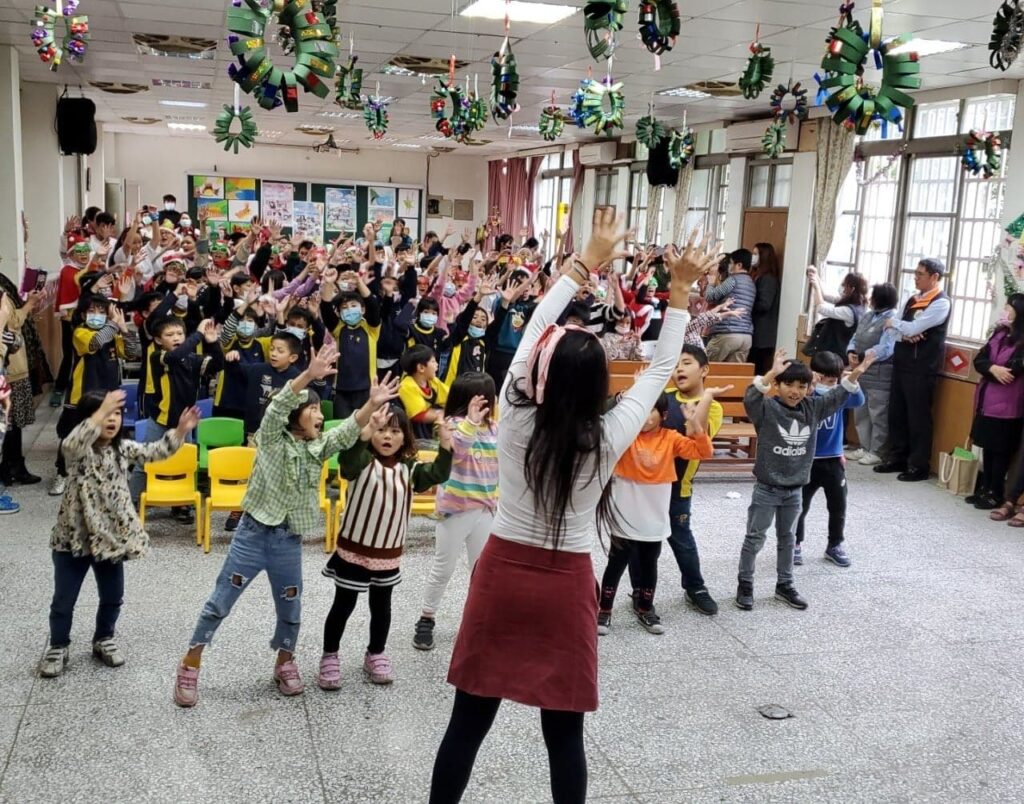
Can you describe what a week in the life of a Fulbright English Teaching Assistant is like?
As a Fulbright Taiwan grantee, I chose where to be placed. I decided to be placed in Taitung and Hualien Counties, mostly Indigenous regions, to learn the best practices to address economic inequality, unequal educational attainment, cultural preservation, and community development and empowerment.
In my first year in Taitung County, I taught at a Beinan and Taiwanese elementary school. In my second year in Hualien County, I taught at a Truku elementary school as the area’s first foreign Fulbright English Teaching Assistant (ETA) before returning to my first school in Taitung.
In my first post, I worked and volunteered at least 60 hours per week, teaching up to 90 students per day from Pre-K through 6th grade. I taught around 24 classes per week at a remote, low-resourced school with limited English proficiency. Having learned from that experience, I set the expectations for what the community could expect from an ETA in my second teaching post.
I taught classes solo, as a lead, and as an assistant. My primary responsibility was teaching English, and I worked with my co-teachers to balance the mandatory textbook curriculum with our own curriculum centered on diversity. We aimed to ensure our students could feel seen and identify parallels with the U.S. multicultural experience. I also assisted with other classes, including ukulele, gym, art, and Truku language. I also organized and participated in various cultural and language exchanges with colleagues.
Taiwan Fulbright ETAs help plan and execute prominent school events. Aside from co-programming and co-teaching the English music and dances for grades 4-6, I led our school’s last dance at our Christmas concert, a significant community, and corporate sponsor event.
Some of my favorite memories were leading an “I Am Beautiful” art project for students to celebrate their identities, teaching dodgeball and Egyptian Rat Screw (card game) to student and teacher fanfare, and coordinating surprise birthday parties and thank you cards for teachers at school-wide Christmas celebrations.
Outside of teaching, I divided my time between Fulbright ETA responsibilities and local community engagement. I co-led Fulbright Taiwan’s first DEI task force, learned Mandarin and martial arts from some of my students and colleagues, and spent time with students in whatever capacity they needed and would make them happy. I was lucky enough to live amongst my students and their families and would see them daily around the neighborhood. I sought to understand the communities’ history, culture and needs better. With the communities’ generosity and invitation, I attended traditional celebrations, visited families to tutor and play with kids, spoke to parents to listen to their dreams for their children, volunteered with community centers, organized English teaching and other volunteer projects with other Fulbright ETAs, and danced with the local aunties.
Some of my favorite memories include a sixth-grade girl inviting me to 7-Eleven to show me her pet hamsters, students’ parents insisting that friends and I eat roadside BBQ with them when we walked by, singing and dancing to “Baby Shark” for the hundredth time with a Vietnamese kindergartener, and aunties and uncles throwing parties at local temples and their houses. And, of course, watching my students grow up happy and taller than me was a joy.
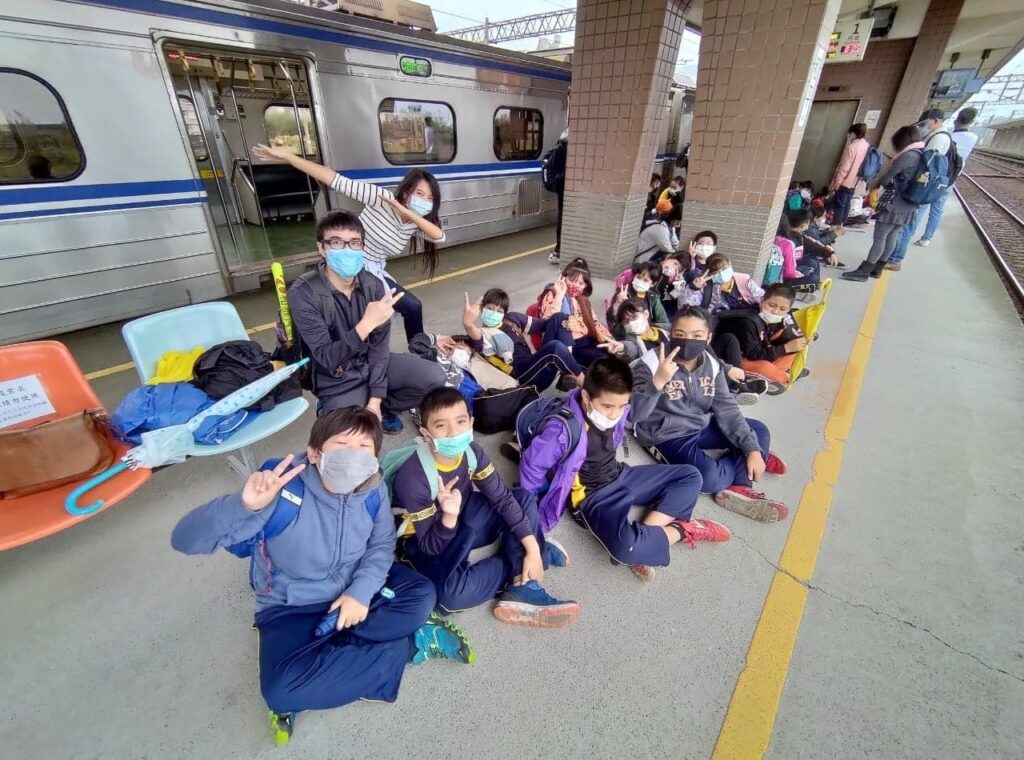
How did your Fulbright ETA experience enable you to advance your career and expand your professional network?
I fulfilled all of the goals I came to Taiwan with and more. I’m grateful to my host communities for giving me many memories and laughter in my two years and helping me hone my Mandarin, emotional intelligence, and leadership style. My students and teachers gave me grace and patience as they taught me Zhuyin (the sound-based writing system for Chinese), proper pronunciation, and language exchange.
After my Fulbright ETA grant, I pursued full-time Chinese language study at Taiwan’s National Cheng Kung University Chinese Language Center to move from basic to intermediate/advanced Chinese proficiency. My knowledge of colloquial Chinese and the local Taiwanese community, which my international classmates had little exposure to, were value-adds in the classroom and ultimately helped me excel and win a language scholarship. Outside of school, I founded and quickly grew my education consulting business in Taiwan. Introducing myself as a Fulbright ETA grantee attracted Taiwanese, U.S., and international clients.
Any Asian Fulbright ETA grant is a pipeline into careers in Asia, education, government, international relations, law, public policy, and other social sciences, so many of my Fulbright peers were able to secure acceptances at competitive graduate institutions, fellowships, scholarships, and jobs. Since I wasn’t pivoting into those fields, I had to be more creative about presenting my Fulbright ETA experience in my professional journey and utilizing my connections. Whatever route Fulbright alums pursue after their fellowship, the Fulbright experience is a gateway. However, spinning it for some sectors is more straightforward than others, and I wish Fulbright could provide more resources for all sectors. For my pivot into business, I leveraged the vast Fulbright alumni network with rich experiences across countries and sectors for advice on making a career change. I spoke with several Fulbrighters about their careers in business.
The Fulbright English Teaching Assistant Program offers U.S. students and professionals an opportunity to gain experience living and teaching abroad. How did your Fulbright ETA experience impact you personally and professionally?
The Fulbright ETA was a transformative experience. It convinced me to transition my career goals and provided me with a solid foundation from which to do so. As a young professional, I began my grant, hoping to advance international human rights law. I left seeking to build upon my nonprofit and direct community work experience to enter social impact consulting to advance underestimated communities’ socioeconomic mobility on a grander scale, specifically in nonprofit and community development.
While working and volunteering to give my students the love and mentorship they needed, I was humbled to realize that time, love, and hard work without practical business acumen and skillsets could not fulfill critical financial needs — the roots of my students’ problems. With the right combination of heart and mind, we can do more to improve the economic and social mobility of communities negatively impacted by wealth inequality, government negligence, and climate change for transformational change.
This fall, I am pursuing a Master’s in Business Administration (MBA) at the University of Michigan Ross School of Business as a Forté Fellow. With my MBA, I hope to learn how to support proximate leadership, partnering with leaders and communities with lived experiences spearheading existing homegrown efforts to create sustainable change in community development, and how to lead with “restorative love” like the Indigenous community leaders who welcomed me into their lives.
Fulbright is a name that will start conversations and new pathways. Even though I chose to pursue a career atypical of Fulbright alums, I’m grateful to Fulbright for setting me up for competitive fellowships, the MBA admissions process, and job interviews. Fulbrighters’ reputation as hard-working cultural ambassadors with strong global community-building skills and cultural and language expertise is a positive signifier to those familiar with the Fulbright U.S. Student Program.
When people saw “Fulbright” on my resume, LinkedIn, or email signature, they were responsive when I contacted them for informational interviews about graduate school and jobs. Even though I have yet to pursue a traditional business path and there is a significant lack of Fulbright alumni in MBA programs, I found that Fulbright was a name that admissions officers and firms recognized. In business school, my international experience will enrich classroom discussions by bringing the perspective of communities impacted by business and environmental, social, and governance (ESG) decisions, a significant knowledge gap in these spaces.
Since many Fulbright grantees become experts or enter positions of power, Fulbright provides a strong network should I later start my own social enterprise or social impact initiative. In terms of skills, the Fulbright grant has been an excellent incubator for transferable skills to any profession, including:
- managing projects,
- cultivating and sustaining genuine relationships,
- anticipating and understanding client needs,
- approaching problems with patience and grace under pressure, and
- navigating cultural and language differences
After working with hundreds of elementary school students and colleagues in a fast-paced environment every day, I’ve grown as a leader and know I can handle new environments with strengthened resilience. Most importantly, out of any professional opportunity, Fulbright has taught me the most about building relationships, respect, and trust.
To become better social impact professionals, we must become better human beings. When we live in another country, we witness alternative frameworks that successfully re-envision what “living” and “community” can look like.
In Taiwan, it was reaffirming to see my frameworks of giving, sincerity, and care – seen in the U.S. as idealistic at best or naive and obsequious at worst, lived out in other cultures every day. I’m both nervous and excited about the challenge of bringing this softness, kindness, 熱情 rèqíng, and reciprocity to the U.S. professional world.
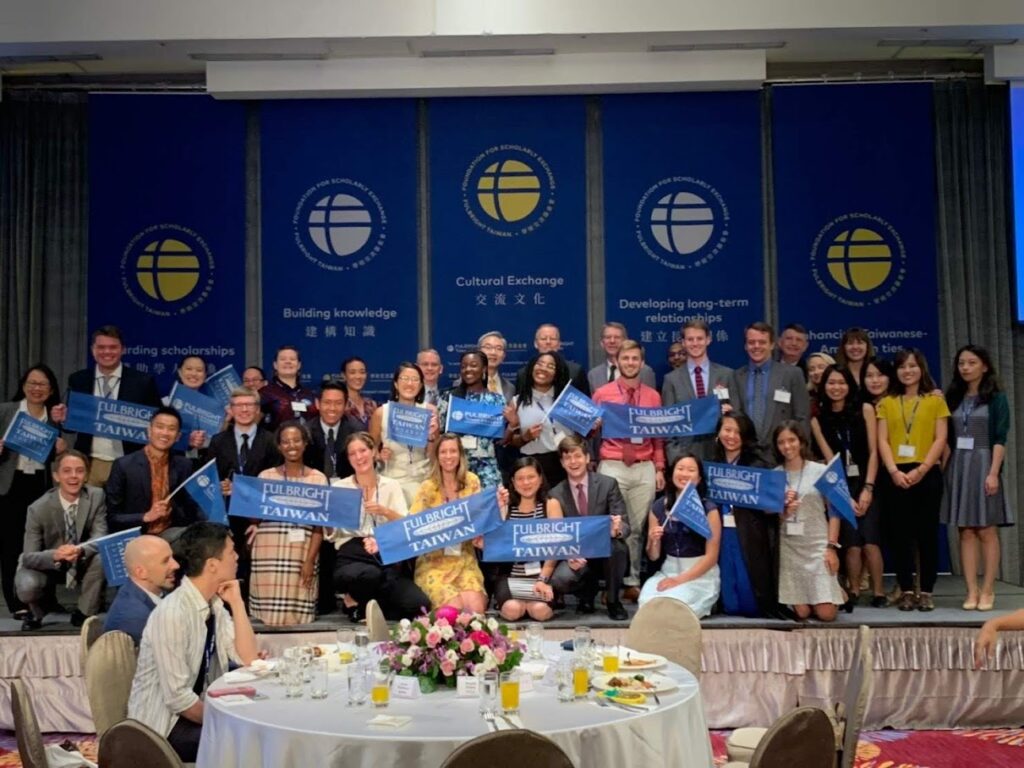
What advice do you have for others applying for a Fulbright English Teaching Assistant Award or another Fulbright grant?
- If you were rejected the first time, try again. I’m a successful reapplicant!
- If you identify as a BIPOC, LGBTQ+, first-generation, low-income, disabled, underrepresented, or older candidate, Fulbright needs more people like you. You have a lot to contribute to Fulbright and the communities they partner with.
- The Fulbright ETA grant is a full-time English-teaching job, not a language-learning fellowship. There is less time to study the language formally, but engaging the local community daily makes up for it.
- Writing the Fulbright statement of grant purpose and personal statement is an art. It is different from most application writing you will have done before. It’s challenging and took me five months to learn, but it will yield more success than writing the essays at the last minute, which I did for my first unsuccessful application. Fortunately, once you’ve gone through the process, you can repeat it for graduate school and other fellowships.
- Your Fulbright application must tie into future short- and long-term plans. Your goals should be ambitious yet realistic. I recommend that applicants from business or STEM backgrounds speak to grantees with similar experiences to understand how to make the connection in their application.
- Write the drafts, see what’s needed, then contact current Fulbright grantees and alums for informational interviews. I identified my people on social media and blogs.
Build a good support team. I had essay reviewers, as well as an emotional support team. There are also support networks and forums online, but use them carefully. Spending too long on these can be unhealthy. - Interviewing is also an art. Learn how to interview correctly. (ProFellow offers a workshop by Fulbright alumna Dr. Vicki Johnson: Interview Secrets of Successful Candidates).
- Other helpful Fulbright resources include ProFellow’s Fulbright Applicant Mastermind and Fulbright application tips articles, which include interviews with former Fulbright winners, Fulbright affinity groups (e.g., Fulbright Prism, Fulbright Noir, Fulbright Latinx, Fulbright Lotus, Fulbright Salam, Fulbright HBCU, and Fulbright Disability), and Fulbright country DEI groups.
Congratulations on submitting your application! That in itself is a significant accomplishment.
What advice do you have for Fulbright grantees embarking on their Fulbright experience?
I am grateful for the words of wisdom and grace that a BIPOC Fulbright alumna offered me before I left for Taiwan, so I’ll share mine here:
- Lean into your strengths when applying and on the grant. I’m far from an athlete, so I couldn’t bond with students by playing soccer with them. However, I did bond with them by tapping into my extroverted energy and hanging out with them during every break between classes, after school, and on weekends. Some friends bonded with their students through dance and art.
- The Fulbright grant is many grantees’ first time being a professional for one year. If the experience is challenging, you’re doing it right. Find meaning in hard work.
New friends will come from unexpected places. My housemates and I found friends in the local aunties who danced Zumba next door, and my friends became friends with the local smoothie aunties. - Building community and long-lasting friendships with the host community is hard work, especially after a 40-60 hour work week working with energetic kids. It takes 3-6 months to develop trust and form strong relationships.
Learn the birth names of students, colleagues, and community members. Their eyes light up with joy when you say them. - Learn and recognize the privilege that Fulbright grants to foreign countries provide (e.g., preferred visa status, high salary, job title, national health insurance without being taxed, and many more). Fulbright grantees to the U.S., Peace Corps Volunteers, AmeriCorps members, and immigrants do not receive these benefits. It is humbling and inspired me to work hard in return.
- After you leave, stay in touch with the community as much as you can in whatever capacity you can. It means a lot to them. After finishing my Fulbright ETA grant, I continued living in Taiwan and returned for significant school and community events. After leaving Taiwan, I stayed in touch over social media and filmed congratulatory videos for my sixth graders’ graduations. Gaining access to these communities is a great privilege. Being treated as a guest in them is an even greater one. Instead of frequently remarking on the community’s kindness, I encourage every Fulbrighter to ask ourselves what we’re doing with and for the community in return beyond fulfilling our teaching duties.
Sunny Huang has worked with diverse clients and communities across different